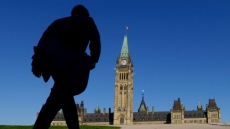OTTAWA — As last autumn's colours were setting in, veteran Ottawa lobbyist Dan Kelly was confident the spring would produce a federal budget surplus with ample room for announcements.
But following a long winter, the head of the Canadian Federation of Independent Business is approaching Tuesday's election-year budget with his hopes somewhat in check.
"Things were trucking on really well, we were certainly thinking very positively about some of our requests — some of our tax-reduction requests in particular," Kelly said in an interview.
"But then, of course, that was before Christmas. So, then when oil prices started to plummet, then a few big question marks started to cloud the otherwise rosy picture."
Only about six months ago, the Harper government's surplus kitty for budget day goodies in the 2015-16 fiscal plan was said to have swelled to $6.5 billion, Kelly said.
Cabinet ministers who had waited years for a balanced budget were salivating at the thought of being able to spend money for once.
By October, however, everything started to change.
First, the Conservatives unveiled their long-promised family tax-and-benefit package, a grab bag of measures expected to carve $4.6 billion in revenue out of public coffers.
Then, the weeks that followed brought the deep, unexpected plunge in world oil prices, a crash Ottawa has predicted will indirectly chew billions of dollars from its bottom line.
Today, the surplus cupboard is bare and the Conservatives had to scramble to deliver on a long-held pledge critical to their re-election hopes: a balanced 2015-16 budget.
The finance minister has indicated the budget's $3-billion contingency reserve — designed as a cushion against unforeseeable events like natural disasters — could be in play. Earlier this month, the government unloaded its remaining shares in General Motors for about $3.26 billion.
Last week, the Bank of Canada blamed the oil-price shock for its "zero growth" projection for the first three months of 2015, a stretch governor Stephen Poloz has warned will produce economic data that looks "atrocious."
And those once-hopeful cabinet ministers? They're waiting to see if there are any budget leftovers for their departments.
Kelly, who had 20 or 30 budget-related meetings over the past year with officials, said the government's shift in tone was impossible to miss.
"With the oil-price decline you could feel it in meetings," he said of his exchanges with the government, including several discussions with Finance Minister Joe Oliver himself.
"They've been pretty careful to try to make sure that every group that's out there with a budget request puts some water in their wine."
Kelly, however, said he remains "cautiously optimistic" the budget will address his group's top request for a reduction to the small business corporate tax rate.
The federation has been lobbying the government to lower the rate to nine per cent from its current level of 11 per cent.
But Kelly has had to tweak his pitch somewhat and he now believes any tax cut might have to be phased in — perhaps a half-percentage point at a time over four years.
"I'm no longer expecting the full victory that I was hoping for perhaps this time last year," said Kelly, who expects many interest groups in the capital have tempered their expectations.
Not everyone. The president of another powerful lobby group, the Canadian Manufacturers and Exporters, believes the oil-price slide may have helped his cause.
Jayson Myers said governments are looking to manufacturing and export industries to help lift the country's economic fortunes, particularly as the energy and commodity sectors struggle and consumer spending shows signs of maxing out.
Geography doesn't hurt, either, as politicians zero in on key political terrain that overlaps the cradle of Canadian manufacturing, Myers said.
"In an election year like this, where the battleground is in southern Ontario and in southern Quebec, I think manufacturing becomes even more important, politically," he said.
Myers said he's "pretty optimistic" his group's No. 1 request for another extension to the government's accelerated write-off for manufacturing equipment and machinery will appear in the budget.
He hopes the government will extend it for longer than two years or, perhaps, make it a permanent fixture to help Canadian manufacturers compete with U.S. companies.
The system, he added, costs about $1.5 billion every two years.
Following the long winter of low crude prices, the government's need for fiscal discipline is more important than ever heading into Tuesday's budget, Employment Minister Pierre Poilievre said in an interview.
"We can't spend money that we don't have and if revenues soften slightly that means that we have to control our spending accordingly," he said late last week.
When asked what Canadians might expect in the budget with regards to skills and training, Poilievre talked about his "No. 1 priority": a loan program to help newcomers obtain recognition in Canada for their foreign credentials.
He said his department ran a successful pilot project that provided small loans to immigrants so they could pay for courses to have their professional training accepted in Canada.
"This is actually an area that's extremely important to me and I'm hoping that we can do more in this area," said Poilievre, who insisted he didn't know what would be in the budget.
"We all provide input but we don't get a heads up until it actually comes out."



